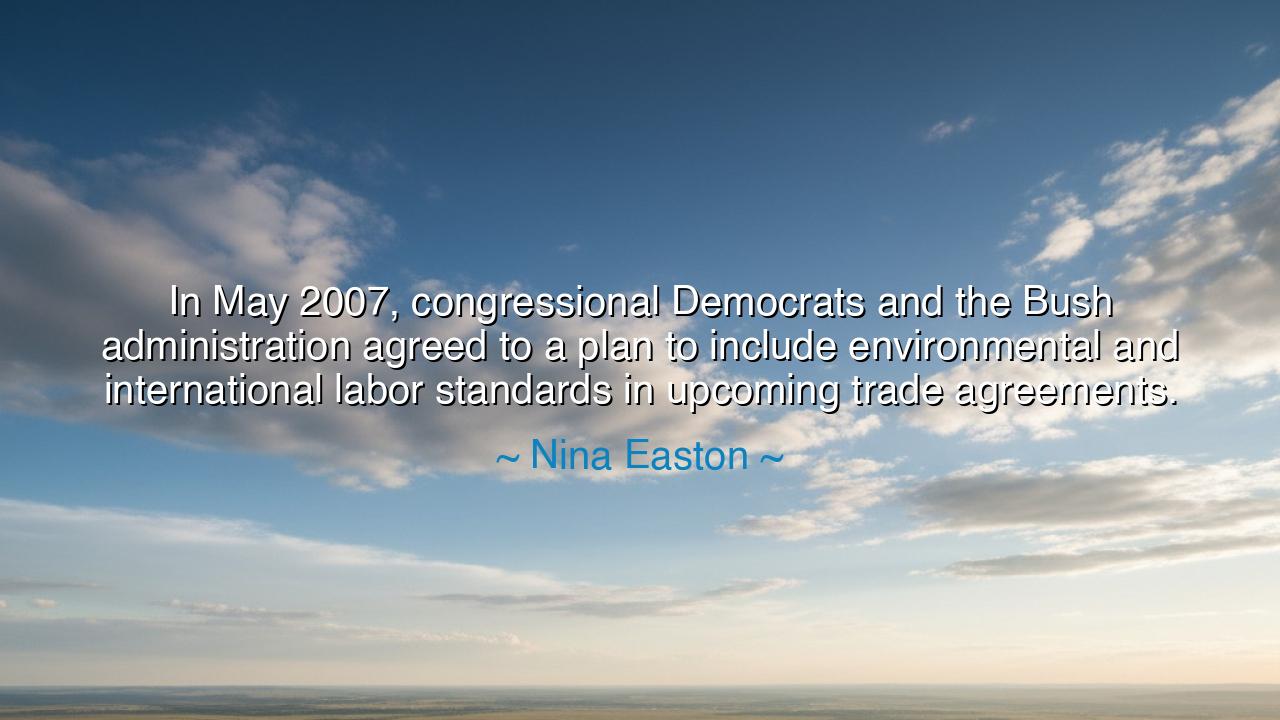
In May 2007, congressional Democrats and the Bush administration
In May 2007, congressional Democrats and the Bush administration agreed to a plan to include environmental and international labor standards in upcoming trade agreements.






Hear the words of Nina Easton, who bore witness to the weaving of policy and power, and who declared: “In May 2007, congressional Democrats and the Bush administration agreed to a plan to include environmental and international labor standards in upcoming trade agreements.” This statement, though it speaks of politics and law, holds within it a deeper current—the recognition that commerce, that mighty engine of nations, must not run without conscience. For trade is not only the exchange of goods, but the shaping of destinies, the ordering of labor, and the stewardship of the earth.
She speaks first of the year 2007, when opposing parties—Democrats and Republicans, long divided—chose to set aside quarrel for a greater cause. In their agreement, there was a rare harmony: the acknowledgment that environmental standards and labor rights must be tied to the treaties that govern global trade. This was not merely a matter of tariffs and exports, but of justice itself. For what use is prosperity if it poisons the soil? What use is wealth if it rests upon the backs of laborers denied dignity?
The environmental standards carried within this plan were a shield for the earth. They sought to ensure that rivers would not be choked with the waste of unchecked industry, that forests would not fall endlessly to satisfy distant markets, that the atmosphere would not bear the full burden of careless growth. By binding these standards to trade agreements, the leaders of that time recognized that the health of the earth must be honored across borders, for the winds and waters of one nation do not stop at its boundaries.
The international labor standards were a cry for the worker. In the shadows of global trade, millions toil in sweatshops, in unsafe factories, in fields where rights are but whispers. By including these protections in agreements, America signaled that labor is not a commodity to be traded cheaply, but human beings to be treated with dignity. It was a call to ensure that the prosperity of one nation would not come at the exploitation of another.
History has shown us the cost of ignoring such truths. In the early 20th century, the Triangle Shirtwaist Factory fire in New York claimed the lives of 146 workers, most of them young immigrant women, trapped by locked doors in a burning building. Their deaths ignited reform, forcing labor laws to protect the vulnerable. So too, the Dust Bowl of the 1930s revealed the cost of reckless farming and neglect of the land. These lessons teach us that when commerce forgets humanity and environment, it reaps tragedy instead of wealth.
The deeper meaning of Easton’s words is that economics and ethics are bound together. Trade cannot be measured by profit alone; it must also be weighed by its cost to the earth and to the worker. A nation that ignores this truth builds wealth upon sand, for the collapse of ecosystems and the unrest of exploited people will sooner or later undo even the strongest empires. True prosperity is not in numbers on a ledger, but in harmony—between nations, between people, and between humanity and the earth.
What lesson, then, must future generations take? It is this: when you speak of trade, speak also of justice. When you purchase, consider not only the price, but the story behind it—the hands that made it, the soil that grew it, the waters that carried it. Support leaders who bind commerce to conscience, and resist those who would separate them. For the health of the world depends on choices both great and small, from the halls of Congress to the markets of daily life.
Thus let Nina Easton’s words endure as a reminder: true trade is not only exchange, but responsibility. When nations join hands in commerce, they must also join hearts in stewardship and justice. Only then can wealth be called prosperity, and only then can humanity walk forward without leaving ruin behind.






AAdministratorAdministrator
Welcome, honored guests. Please leave a comment, we will respond soon